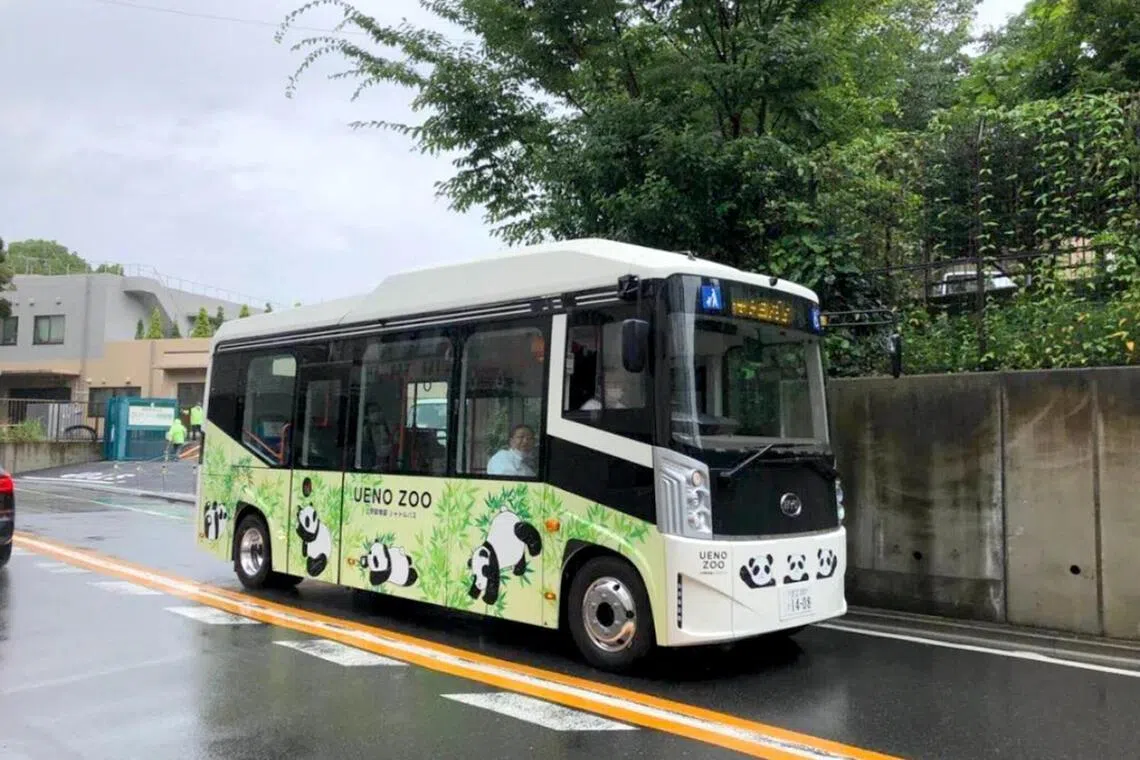Driverless public buses: $8.1m contract awarded for 16-seat vehicles to ply routes in Marina Bay, one-north
Sign up now: Get ST's newsletters delivered to your inbox

The 16-seater driverless buses will be similar to the BYD buses currently used in Japan.
PHOTO: LTA
Follow topic:
- A consortium won an $8.1 million contract to deploy six 16-seater electric driverless buses in Marina Bay and one-north by 2026.
- The buses will initially run on routes 400 and 191 with a safety operator and customer service officer. Monitoring will occur in real-time.
- LTA aims for 100-150 self-driving vehicles by 2026. Fares will match standard services and SBS Transit will gather commuter feedback.
AI generated
SINGAPORE – A consortium has won a contract to deploy driverless vehicles on two public bus services in Marina Bay and one-north from the second half of 2026.
Valued at around $8.1 million, the contract was awarded to the consortium comprising software and applications developer MKX Technologies, autonomous vehicle (AV) specialist Zhidao Network Technology (Beijing) and electric vehicle maker BYD.
It is part of Singapore’s push to deploy AVs across the island in the next five years to enhance the public transport network
The contract includes six 16-seater electric buses, AV software and hardware, as well as associated systems needed to run the public bus services.
In its announcement on Oct 2, the Land Transport Authority (LTA) said the vehicles will be piloted on public bus services 400 (Marina Bay) and 191 (one-north) for an initial period of three years.
Service 400 serves the Marina Bay and Shenton Way areas, stopping at Marina Bay Cruise Centre and Gardens by the Bay, as well as Shenton Way and Downtown MRT stations.
Service 191 plies the one-north area. Besides the Buona Vista bus terminal, it also stops at one-north and Buona Vista MRT stations.
After the six units are deployed, LTA can procure 14 more driverless buses from the consortium and expand the pilot to more public bus services in Singapore.
MKX Technologies, which is owned by a Singapore subsidiary of Chinese online vehicle financing company Yixin Group and Japanese electric car-sharing company MK.X, will lead the local research and development, as well as project management work.
Zhidao Network Technology will provide the AV software, as well as hardware like the light detection and ranging sensors, cameras, fleet management and remote operations systems.
The company is linked to Chinese autonomous driving start-up Mogo Auto, which is backed by technology conglomerate Tencent.
Chinese carmaker BYD will supply the electric buses.
The driverless vehicles will have features similar to those of existing public buses, including designated spaces and ramps for wheelchairs, personal mobility aids and strollers.
They will run alongside manned buses as part of a hybrid fleet. During the pilot phase, the fares will be identical to those in the standard service.
LTA will test the driverless buses before they are deployed. It said that it will work closely with the consortium to ensure that the buses and supporting systems are operationally ready.
Initially, a safety operator will be stationed on each of the driverless buses at all times, while LTA will monitor in real time how the buses are performing and ensure they comply with regulations.
Public transport operator SBS Transit, which runs the two bus routes, will gather feedback from commuters to review and improve the driverless bus operation.
When the autonomous vehicles are confirmed to run safely and smoothly, the safety operator on board will be replaced by one stationed in a remote control centre. A customer service officer will then be deployed on the buses to assist commuters.

Public transport operator SBS Transit, which runs the two bus routes, will gather feedback from commuters to review and improve the driverless bus operation.
PHOTO: LTA
To enable existing bus drivers to serve as safety operators and operate the autonomous buses competently and confidently, the consortium will work with the Singapore Bus Academy to provide the necessary training, LTA said.
The tender was called by LTA in January to evaluate using AV technology
The authority said the four proposals received were evaluated based on the maturity of the AV technology, the AV developer’s track record in local and overseas deployment, and its capability to meet the operational needs of public bus services.
Mr James Ng, managing director of BYD Singapore and the Philippines, said the brand’s record of supplying buses for public transport in Singapore and overseas contributed to the consortium’s success in clinching the contract.
By the end of 2025, there will be 300 BYD electric buses in Singapore’s public bus fleet, under a contract awarded by LTA in 2023.
According to MKX Technologies, the latest contract also covers the provision of liquid-cooled, high-speed chargers from Chinese tech giant Huawei.
Senior Minister of State for Transport Sun Xueling said on Facebook on Oct 2 that the pilot allows the Government to understand how AVs can “safely and meaningfully complement our public transport system”.
She added that the technology can help the sector cope with manpower shortages while continuing to meet the needs of commuters.
The Straits Times previously reported that three other proposals
The announcement on Oct 2 comes after the launch of self-driving shuttles in Punggol
Acting Transport Minister Jeffrey Siow said on Sept 20 at the launch of the autonomous shuttles that the Government aims to have between 100 and 150 self-driving vehicles by the end of 2026.


